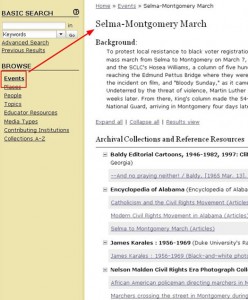As we sort the rubble of turkey carcasses and pie tins looking for motivation to return to work, a couple of news items about the Digital Library of Georgia.
1. The Civil Rights Digital Library has been awarded 2010 Schwartz Prize for excellence in the public humanities by the Federation of State Humanities Councils. Read the University of Georgia press release here.
The second Schwartz Prize goes to an initiative to deliver education content on the civil rights movement via the web. This online library contains 30 hours (about 450 clips) of historical news footage, a civil rights portal that allows users to access material on the movements from 100 libraries and organizations nationwide, and instructional video.
 2. Sheila McAlister – data wrangling librarian by day, polka dotted roller derby queen by night – is profiled in the University of Georgia Columns. Learn a bit about the DLG’s Associate Director and her role in making the DLG a successful enterprise.
2. Sheila McAlister – data wrangling librarian by day, polka dotted roller derby queen by night – is profiled in the University of Georgia Columns. Learn a bit about the DLG’s Associate Director and her role in making the DLG a successful enterprise.
“One of my favorite things about this job is figuring out how to do a project—the planning. In reviewing grant proposals, you pull it apart, ask if it’s feasible, will it have an impact? I really enjoy that analysis,” McAlister said. “I also make suggestions to applicants on how to improve their projects.”



